Planetary Boundaries
> Earth Paradigm
Ecological Footprint Quiz by Center for Sustainable Economy.
Carbon footprint Offsets
List of environmental organizations. This is a list of the more notable environmental organizations by organization type (intergovernmental, governmental or non-governmental) and further subdivided by country.
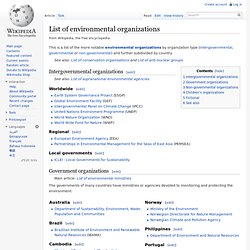
Intergovernmental organizations[edit] Worldwide[edit] Regional[edit] Local governments[edit] ICLEI - Local Governments for Sustainability Government organizations[edit] The governments of many countries have ministries or agencies devoted to monitoring and protecting the environment: Non-governmental organizations[edit] These non-governmental organizations are involved in environmental management, lobbying, advocacy, and/or conservation efforts: Children's organizations[edit] Project Green Oman. Global Environment Facility. The Global Environment Facility (GEF) unites 183 countries in partnership with international institutions, civil society organizations (CSOs), and the private sector to address global environmental issues while supporting national sustainable development initiatives. Today the GEF is the largest public funder of projects to improve the global environment. An independently operating financial organization, the GEF provides grants for projects related to biodiversity, climate change, international waters, land degradation, the ozone layer, and persistent organic pollutants.
Since 1991, the GEF has achieved a strong track record with developing countries and countries with economies in transition, providing $11.5 billion in grants and leveraging $57 billion in co-financing for over 3,215 projects[1] in over 165 countries.
In Depth. Earth System Governance Project. The Earth System Governance Project[1] is a long-term, interdisciplinary social science research programme developed under the auspices of the International Human Dimensions program on Global Environmental Change, and started January 2009.
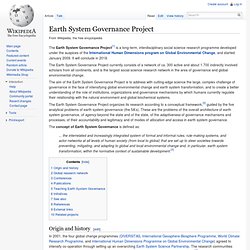
It will conclude in 2018. The Earth System Governance Project currently consists of a network of ca. 300 active and about 1.700 indirectly involved scholars from all continents, and is the largest social science research network in the area of governance and global environmental change.
International Environmental Governance. United Nations Environment Programme. The United Nations Environment Programme (UNEP) is an agency of the United Nations that coordinates its environmental activities, assisting developing countries in implementing environmentally sound policies and practices.
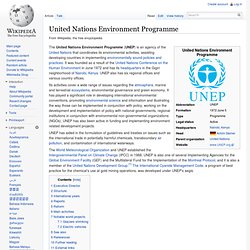
It was founded as a result of the United Nations Conference on the Human Environment in June 1972 and has its headquarters in the Gigiri neighborhood of Nairobi, Kenya. UNEP also has six regional offices and various country offices. Its activities cover a wide range of issues regarding the atmosphere, marine and terrestrial ecosystems, environmental governance and green economy. It has played a significant role in developing international environmental conventions, promoting environmental science and information and illustrating the way those can be implemented in conjunction with policy, working on the development and implementation of policy with national governments, regional institutions in conjunction with environmental non-governmental organizations (NGOs).
United Nations Environment Programme (UNEP) - Home page. Intergovernmental Panel on Climate Change. The Intergovernmental Panel on Climate Change (IPCC) is a scientific intergovernmental body under the auspices of the United Nations,[1][2] set up at the request of member governments.[3] It was first established in 1988 by two United Nations organizations, the World Meteorological Organization (WMO) and the United Nations Environment Programme (UNEP), and later endorsed by the United Nations General Assembly through Resolution 43/53.
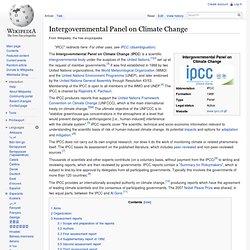
Membership of the IPCC is open to all members of the WMO and UNEP.[4] The IPCC is chaired by Rajendra K. Pachauri. The IPCC does not carry out its own original research, nor does it do the work of monitoring climate or related phenomena itself. The IPCC bases its assessment on the published literature, which includes peer-reviewed and non-peer-reviewed sources.[7] Thousands of scientists and other experts contribute (on a voluntary basis, without payment from the IPCC)[8] to writing and reviewing reports, which are then reviewed by governments.
IPCC - Intergovernmental Panel on Climate Change. Climate Change: Vital Signs of the Planet. Crash Course. Planetary boundaries. PLOS ONE : accelerating the publication of peer-reviewed science. For a sustainable and desirable future. Encyclopedia of Earth. Obama vs. physics: Why climate change won’t wait for the president. Change usually happens very slowly, even once all the serious people have decided there’s a problem.
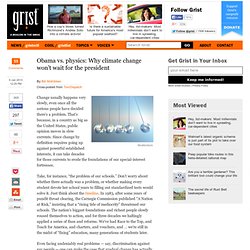
That’s because, in a country as big as the United States, public opinion moves in slow currents. Since change by definition requires going up against powerful established interests, it can take decades for those currents to erode the foundations of our special-interest fortresses. Take, for instance, “the problem of our schools.” Don’t worry about whether there actually was a problem, or whether making every student devote her school years to filling out standardized tests would solve it.
Just think about the timeline. Even facing undeniably real problems — say, discrimination against gay people — one can make the case that gradual change has actually been the best option. Which is not to say that there weren’t millions of people who suffered as a result. And that’s always been the difficulty with climate change — the greatest problem we’ve ever faced.





